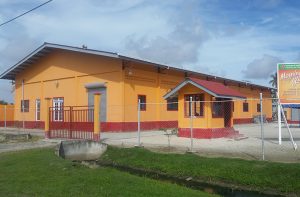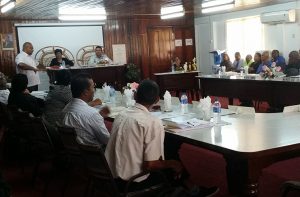By Indrawattie Natram
-says facility no political football

“I think both sides need to be given credit for allowing the project to happen and both sides need to realise that they have tremendous kudos to be had. Thankfully, this is happening and I have no interference by the present government,” Professor Narine said.
Professor Narine during the statutory meeting for the Regional Democratic Council (RDC) Region Two, was allowed by councillors to give a brief overview of the ‘Morning Glory’ cereal plant which was officially commissioned on October 8, 2017.
During his PowerPoint presentation, he explained to councillors as well as to members of the Essequibo Chamber of Commerce, the operation that is currently ongoing at the plant. Professor Narine made in-depth presentations on the ‘Morning Glory’ rice cereal to the council. He also showed a video demonstrating the process of production.
He reminded councillors that the ‘Morning Glory’ cereal is a product that had never existed in the past and as such, it needed time to become accepted on the local market. He called on persons not to set unreasonable expectations on the performance of the new product, which is doing very well.

Narine told the councillors that compared to other leading cereal brands ‘Morning Glory’ rice cereal is being offered at a cheaper price at local supermarkets, which allows the IAST a more comfortable market. Professor Narine said that the IAST is currently working with an exclusive distributor, Ansa McAl, which is assisting the institute in acquiring shelves space in the local supermarkets.
“Morning Glory cereal has been able to command shelf space right next to its competitor, so when a consumer goes to a store they are seeing a cereal costing twice as much and one costing half as much, but with a superior nutrition value, and so we believe that is very important,” said Professor Narine.
Some of the commodities used during the manufacturing process are broken rice, rice bran, sugar and molasses, which are sourced from Guyana except baking soda, vitamins and salt, which are imported.
He said the ‘Morning Glory’ Rice Cereal plant is the only plant in Guyana that is adding value to rice, which caters for the increase of acreage towards which farmers are aiming. He said that the manufacturing process is very ascetic and is done according to good manufacturing practices designed to accommodate ISO accreditation.
The council was told that the capital for the project $101 million.
‘Markets’
Professor Narine said that at the moment, marketing of the product is slow, but the product is currently available at all leading supermarkets. Cereals are also being supplied to the National Feeding Programme and the Guyana Defence Force.
‘Expansion’
Due to the profitability since the plant’s commissioning, there are plans to build a lunch room for staff, reinforcing the drains and installing security cameras at the facility. The plant also hopes to employ more people as business increases. Further, there are plans to manufacture nutrition bars at the facility.
Chairman for the Essequibo Chambers of Commerce, Daleep Singh, commended the IAST for executing such a state-of -the- art project in Region Two, one that provides employment opportunities for persons, as well as highlights the region. Singh however raised concerns over marketing of the project and called for more promotional advertising to be done within the region.
Region Two Chairman Devanand Ramdatt at the end of the presentation thanked Professor Narine for giving a brief overview of the operations at the plant, which he said was timely. Ramdatt said he is always happy to have engagements with the IAST on development of the Anna Regina cereal plant and anticipates future engagements.





.jpg)








